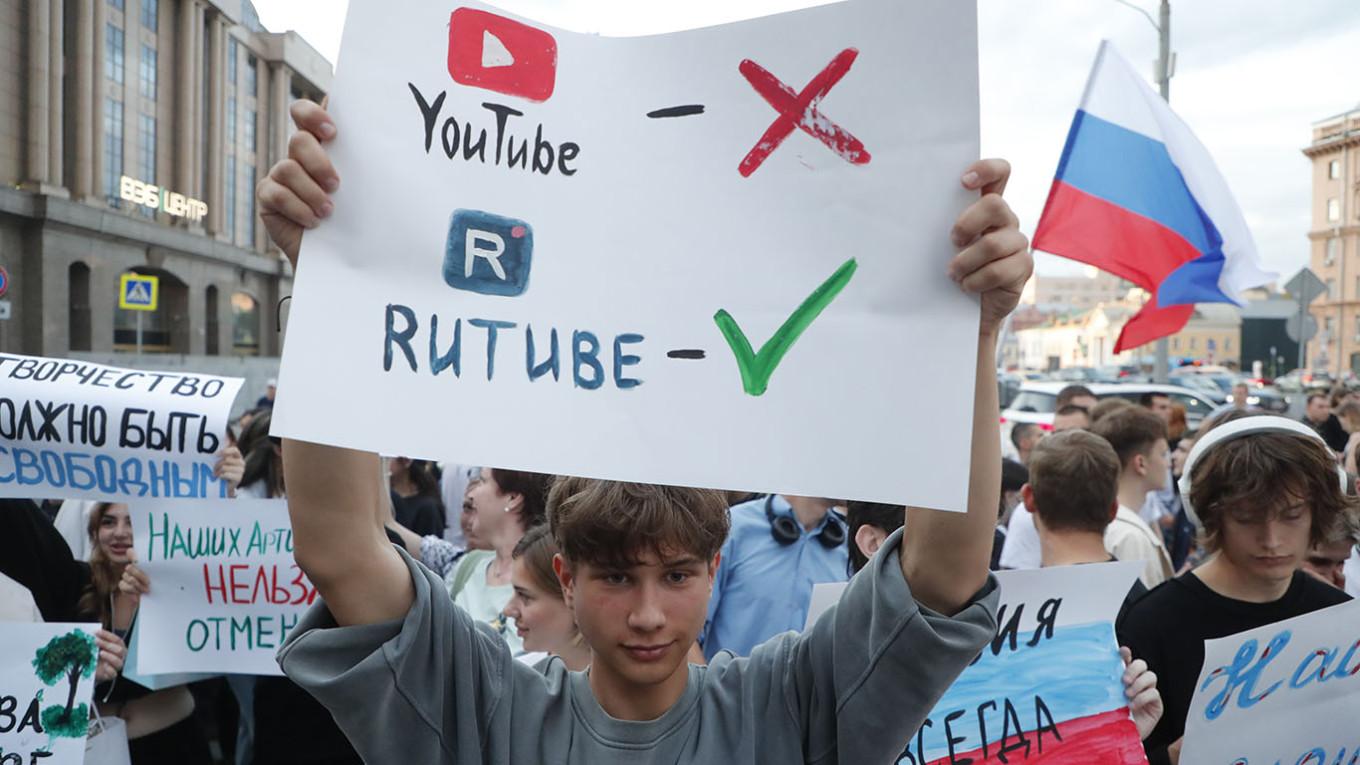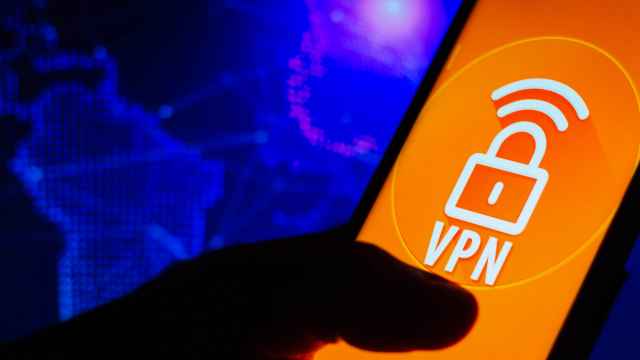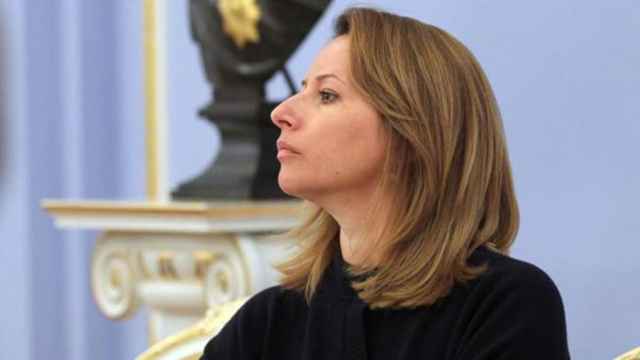When a Russian lawmaker said late last week that the country would start throttling YouTube loading speeds on desktop browsers by up to 70%, it appeared to confirm many Russians’ fears that the country would gradually cut off access to the video platform.
Over the past decade, YouTube has become a vital platform for dissenting viewpoints as the Kremlin has clamped down on internet and media freedoms. For the exiled Russian opposition and independent media, losing it would mean losing a critical means of reaching millions inside Russia and countering the Kremlin’s propaganda.
The slowdowns appear to have been prompted by YouTube’s move to block pro-war musical acts and pro-government channels from its platform.
State Duma deputy Alexander Khinshtein’s announcement of the slowdowns — which he said were “directed ... against the administration of a foreign resource which still believes that it can violate and ignore our legislation with impunity” — came less than two weeks after YouTube removed several pro-Kremlin, pro-war artists such as Shaman.
“Khinshtein wrote it out as clear as day: ‘If they don't follow our laws, we will slow them down.’ What is happening right now is a clear case of blackmail, and this recent wave is connected precisely with the bans on pro-government singers,” Mikhail Klimarev, head of the Internet Protection Society NGO, told The Moscow Times.
Klimarev said that although the slowdowns might appear less effective than banning YouTube altogether, the risks of public discontent stemming from a total YouTube ban would be too high.
He said the Kremlin has also faced difficulties in attempting to ban individual opposition channels, adding that there is likely a communication channel between the opposition and Google to ensure the protection of their speech.
“I am unsure why the authorities are working themselves up about the bans — Khinshtein himself keeps on changing the reasons. Perhaps Putin just likes Shaman’s music enough to play it on repeat. But the fundamental goal is to force Google to sit at the negotiating table and return the singers to the platform,” Klimarev said.
How will YouTubers and their Russian audiences be impacted?
Journalist Alexander Plyushev launched The Breakfast Show on YouTube shortly after he relocated to Vilnius, Lithuania after the invasion of Ukraine. Today, The Breakfast Show has become a staple for its 625,000 subscribers who tune in every morning.
For Plyushev, who was declared a foreign agent in October 2022, as well as many of his colleagues, YouTube has become a lifeline — a means by which those unwelcome and persecuted in Russia can survive and offer their audience both inside and outside Russia alternative viewpoints and analysis into the war in Ukraine and domestic politics.
Plyushev and his colleagues are now waiting to see the true ramifications of the slowdowns.
“It is difficult to measure what the true impact will be. We know that the summer holidays always result in lower viewership,” he told The Moscow Times. “We are certain about 10% of our audience experienced problems with YouTube, but many have learned of ways to circumnavigate the slowdown.”
Plyushev noted that most of Russia’s attempts to create a domestic alternative to YouTube have been futile, including RuTube, which is owned by Gazprom’s media subsidiary.
However, the opposition is already pursuing workarounds such as TBS Radio, which broadcasts The Breakfast Show along with two dozen other channels in audio format.
“It allows us to maintain some sort of connection with our audience back home, and that's what matters,” Plyushev said.
“However, the fact remains that Khinshtein acknowledged that the authorities have begun a gradual attack on Google. This confirms the theories I support, which suggest that the Russian authorities are afraid of cutting off YouTube immediately, so as to not cause an unwanted rush of VPN installations and social discontent,” he added.
Yurii Belyat, head of the news service at the Khodorkovsky Live YouTube channel in Vilnius, told The Moscow Times that the channel has also seen changes in its viewership since the slowdowns started — but that it plans to keep broadcasting by any means necessary.
“We, of course, are seeing the effects of slowdowns and drop in viewership out of Russia specifically,” Belyat said. “However, we do not necessarily believe it is because our audience in Russia shrunk, but rather, it’s because many of them are likely using VPNs to access our channel. We ourselves took the initiative to publish a guideline recommending reliable VPNs and teaching our audience how to use them. However, we understand we will have to search for other means to inform our audience as a backup.”
Klimarev and his colleagues have also not wasted any time in developing other means for Russians inside the country to bypass the restrictions and VPN bans.
In late 2022, he and his colleagues launched VPN Generator, which allows users to create their own VPN servers and distribute them free of charge.
“We are trying to diversify everything, creating different applications with various functionalities, and so on,” Klimarev said. “As long as it works, we will continue our work for as long as we can. We are not the only ones doing this, but there definitely should be more.”
What was it like before?
Russia has ramped up its restrictions on the internet over the past decade as it has sought greater control over the digital landscape, passing a barrage of laws and rules to force compliance from Russian and international companies alike.
In 2021, President Vladimir Putin signed the “Landing Law” requiring foreign social media companies and other internet platforms with large Russian user bases to establish offices in Russia.
Even if the companies risked fines or having Russia-based employees arrested for noncompliance with these increasingly repressive laws, it was too costly to quit the Russian market, which consisted of 124 million internet users that year, according to DataReportal.
Twitter would begin the process of complying with the Landing Law just a month before the full-scale invasion of Ukraine, according to data published on Roskomnadzor's website. Russia blocked Twitter two months later in March.
Who Is Alexander Khinshtein?
Alexander Khinshtein is a State Duma deputy representing Russia's Samara region and a member of the ruling, pro-Kremlin United Russia party. Like many of his colleagues in the State Duma, Khinshtein is known for his crusades against individuals deemed “unfit” for the regime.
In April, he published a series of posts accusing Samara regional official Sergey Burtsev of being in a gay relationship with his subordinate and spreading LGBT propaganda.
"Why is youth policy in the Samara region, excuse me, so badly managed, and why is the upbringing of children being entrusted to openly gay propagandists?", Khinshtein wrote on Telegram.
He would go on to double down on his accusation of LGBT propaganda among Samara officials connected with Burtsev without providing any evidence that Burtsev was openly gay or otherwise an LGBT activist in public or at work. Regardless, Khinshtein wrote that ridding the government of LGBT employees and politicians was a matter of following constitutional law.
Khinshtein has also admitted that his wife uses Instagram, which is banned in Russia due to its parent company Meta being labeled an “extremist organization.”
A Message from The Moscow Times:
Dear readers,
We are facing unprecedented challenges. Russia's Prosecutor General's Office has designated The Moscow Times as an "undesirable" organization, criminalizing our work and putting our staff at risk of prosecution. This follows our earlier unjust labeling as a "foreign agent."
These actions are direct attempts to silence independent journalism in Russia. The authorities claim our work "discredits the decisions of the Russian leadership." We see things differently: we strive to provide accurate, unbiased reporting on Russia.
We, the journalists of The Moscow Times, refuse to be silenced. But to continue our work, we need your help.
Your support, no matter how small, makes a world of difference. If you can, please support us monthly starting from just $2. It's quick to set up, and every contribution makes a significant impact.
By supporting The Moscow Times, you're defending open, independent journalism in the face of repression. Thank you for standing with us.
Remind me later.







